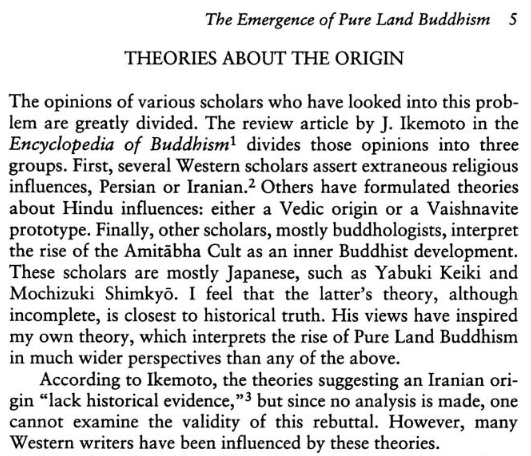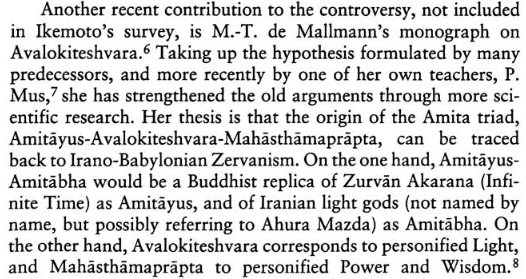The idea of the cardio vascular system polypill for the general promotion of longevity doesn't seem to be in the news much lately, although I still see there are fans.
In any case, I've been thinking comparative religion again, and strategies for making sure you stand the best chance of getting into Heaven (or something like it) from your death bed.
This has particularly been brought to mind by the simple formula offered in Pure Land Buddhism, which is from Amitabha's 18th vow:
If, when I attain Buddhahood, sentient beings in the lands of the
ten directions who sincerely and joyfully entrust themselves to me,
desire to be born in my land, and call my Name, even ten times, should
not be born there, may I not attain perfect Enlightenment. Excluded,
however, are those who commit the five gravest offences and abuse the
right Dharma.
Just to be clear, let's check the list of the 5 greatest offences:
The first one is killing your father. The second is killing your mother.
The third is killing someone who seeks the way of awakening. The fourth
is physically injuring the Buddha. The fifth is disturbing the peace
and harmony of the Sangha community. Any one of these is considered a serious offense in Buddhism, so in the 18th Vow, Amida Buddha also admonishes us never to commit them.
Well, I think I can manage to avoid those.
So, to make it clear, Pure Land Buddhists believe that, for most people, being able to recite Amitabha's name 10 times is a guarantee to re-born into the Pure Land, which sounds a cool place:
Sukhavati is expressively described in the Pure Land sutras as being a
joyous world, soft and glowing, filled with the music of birds and the
tinkling of trees adorned with precious jewels and garlands of golden bells. Amitabha sits on a lotus in the midst of a terraced pond, attended by the bodhisattvas (“buddhas-to-be”) Avalokiteshvara and Mahasthamaprapta.
The newly dead enter into lotus buds, which unfold when the occupants
have become entirely purified and have attained enlightenment. Many are
said to be reborn on Earth after leaving Sukhavati to become
bodhisattvas working toward the liberation (moksha) of all sentient beings.
The exact way to recite Amitabha's name depends on which language you follow, as explained at this Wikipedia page (and also this page).
I like the Sanskrit version which is easy to remember. Form the last link: " 'Namo Amitabha Buddha' which literally mans 'Homage to the Amitabha Buddha ' or 'I seek refuge in the Amitabha Buddha'."
Anyway, this is taking me a long time to get to the point: for someone who remains open to the possibility of entry into an afterlife, but doesn't know which religion gets it right, what's the best practice on a death bed?
I would guess as follows:
a. recite "Namo Amitabha Buddha" ten times;
b. have a Catholic priest handy and make a confession; or if that's not possible, at least make your own mental confession, and recite ten Hail Mary's and the Lord's Prayer;
c. to cover the evangelicals, cry out "I accept Jesus as my Lord and Saviour!", I guess?
d. I was thinking about now making a bad taste joke about doing something that would count as matyrdom for a Muslim, but that is hotly contested as a legitimate part of their religion.
e. As for Hindu's, it seems they believe you'll be reincarnated one way or the other, and there is this advice on an American website (the last surprising bit is my bold):
The condition of one’s consciousness
at the moment of death is considered very important in determining the
state of the next life. Because of this, it’s traditional for Hindus to
die at home, where they can be more easily surrounded by family and
friends who can help create a spiritual atmosphere conducive in helping a
soul depart the body in an auspicious manner. Of course, as it’s become
more and more common for people to die in hospitals — whether out of necessity or choice — loved ones strive to create a spiritual environment as best as possible.
The goal of the departing is to die
while concentrating on a preferred mantra that invokes the presence of
the Divine. Because it’s common for the dying to lose control of their
faculties, including the ability to focus, loved ones provide support by
singing prayers and hymns, and also reading from scripture. As a person
becomes fully unconscious and stops breathing, indicating death’s
arrival, a family member will usually softly chant the preferred mantra
in the person’s ear.
Pouring a few spoons of water from the Ganges — a river in India considered to be sacred
— into the mouth also brings auspiciousness. The personified deity of
Ganga is worshipped as a Divine being, hence her presence at the time of
death helps to ensure a soul’s transition to a spiritually favorable
next life.
So, I guess to be safe, you carry around a vial of Ganges water when you get to old age?
Anyhoo, that's my "polypill" procedures suggestions for guaranteed salvation.
Don't say I'm not a useful blog...





















